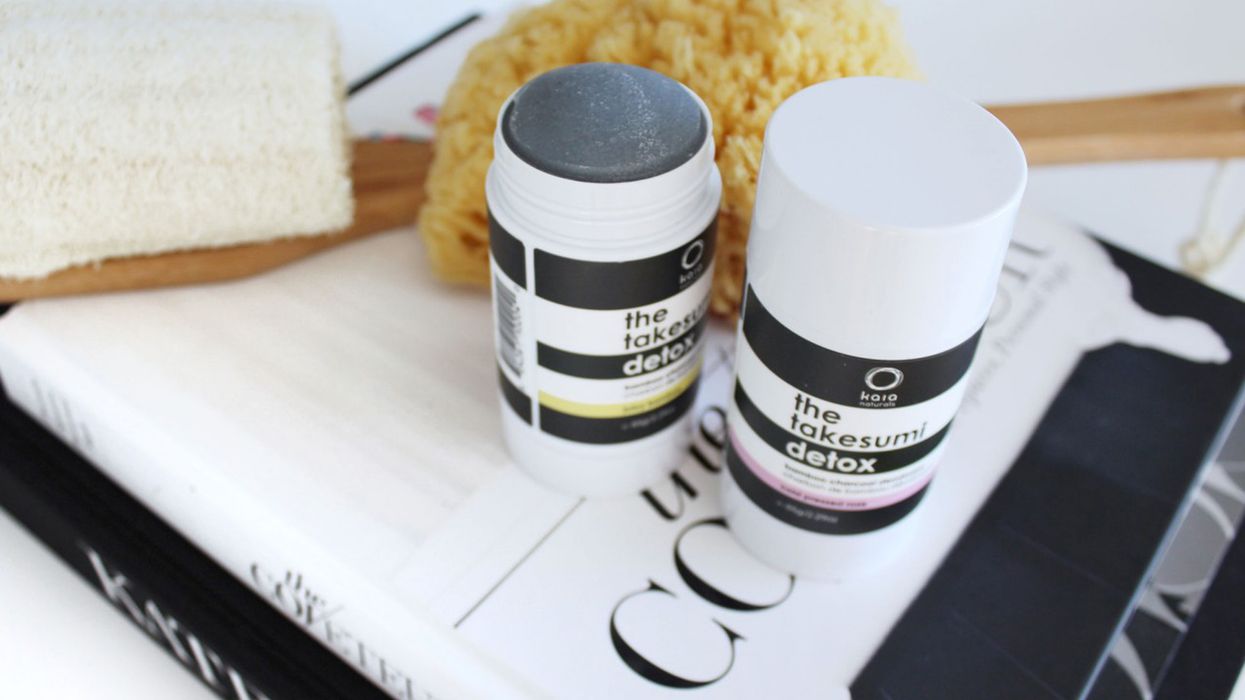
07 May, 2019
10 November, 2021
If you haven’t felt the pressure looming over you by now, it is trés trendy to switch to an all-natural beauty routine, especially when it comes to your deodorant. But there’s been plenty of gossip and misinformation about this particular type of product, from proponents of an all-organic routine to traditional makeup and skin-care users alike. So we decided to cut through all that noise and find out for ourselves if the hype surrounding natural deodorant is really worth it.
First, a primer: Traditional deodorant and antiperspirant is typically formulated with aluminum and artificial fragrances. Those hotly contested ingredients make up the bulk of the argument from the pro-natural deodorant camp. The alternative (should you choose to wear deodorant at all) is natural deodorant, which is formulated using plant-based ingredients and essential oils rather than synthetic fragrance.
To get the scoop on whether or not there’s any validity to the claims surrounding both natural and traditional deodorants, we spoke to some of the top dermatologists in New York City. More important, we decided to ditch our current formulas and embark on a 30-day trial and investigation into natural options. Keep reading to find out everything we learned and whether or not we plan on ditching our traditional deodorants for good.
First, a primer: Traditional deodorant and antiperspirant is typically formulated with aluminum and artificial fragrances. Those hotly contested ingredients make up the bulk of the argument from the pro-natural deodorant camp. The alternative (should you choose to wear deodorant at all) is natural deodorant, which is formulated using plant-based ingredients and essential oils rather than synthetic fragrance.
To get the scoop on whether or not there’s any validity to the claims surrounding both natural and traditional deodorants, we spoke to some of the top dermatologists in New York City. More important, we decided to ditch our current formulas and embark on a 30-day trial and investigation into natural options. Keep reading to find out everything we learned and whether or not we plan on ditching our traditional deodorants for good.
Regular deodorant is linked to both breast cancer and Alzheimer’s: Fiction
Although many natural deodorant brands use this claim in their marketing, a link between the ingredients in traditional deodorant and these diseases has never actually been proven. Aluminum is found in most antiperspirants, since it plugs the sweat glands and limits the amount that you’ll perspire, and according to Dr. Lily Talakoub of McLean Skin Dermatology, there are no studies that implicate it as the cause of either breast cancer or any neurodegenerative diseases, such as Alzheimer’s. However, she does note that some of the other ingredients, like parabens, are thought to disrupt the body’s endocrine system by mimicking estrogen.
Natural deodorant helps prevent sweating: Fiction
Deodorant and antiperspirant are not the same thing. Some products are labeled as both, but they contain different ingredients that perform different functions. According to Dr. Talakoub, “Deodorants prevent odor by preventing the breakdown of bacteria and containing ingredients that mask odor,” typically synthetic fragrances. Whereas an antiperspirant has an active ingredient—usually aluminum or aluminum chloride—to stop your natural sweat production. She compares them to “little corks” that “plug the sweat glands to limit the amount of sweat released from the gland.” Natural deodorants are solely deodorants, not antiperspirants.
The aluminum in regular deodorant is bad for you: Fact (sort of)
While the aluminum in regular antiperspirant does not cause breast cancer or neurodegenerative diseases, it does block your body’s natural sweat production by forming a sort of glue that seals off your sweat glands under your arms. This in turn inhibits your body’s ability to regulate its temperature. While you don’t want to completely block your sweat glands with any product, “normal use of antiperspirants on normal skin with good hygiene, like washing the areas daily with body cleanser, has not been directly found to cause issues,” says Dr. Ellen Marmur of Marmur Medical.
It takes 30 days to detox from regular deodorant and adjust to natural deodorant: Fiction
Although aluminum-based antiperspirant does block your sweat glands, according to Dr. Marmur, “There is no evidence that it takes 28 days for the gland to reopen.” She also calls the claim that regular deodorant causes a buildup of toxins “mythical skin marketing.” She explains that “the immuno-inflammatory circulation cleanses toxins from the body by way of the liver.” That means your body is constantly ridding itself of aluminum or other active ingredients in antiperspirant that it may have absorbed during daily wear.
According to Dr. Talakoub, after you switch to natural deodorant, you may have one or two days of more odor than if you were using regular deodorant, but your sweat will essentially be the same. After using natural deodorant, some of her patients said they actually sweat less. Since antiperspirant inhibits sweating—and therefore prevents your body from cooling itself down—your body has to work extra hard to keep from overheating.
Natural deodorant is non-toxic: Fact
Unlike regular deodorant, natural deodorant brands typically use coconut oil as a base and contain a powder—usually composed of baking soda and arrowroot—to wick away moisture. This is then supplemented with natural oils for odor control. When essential oils are used, they also help to combat odor-causing bacteria.
Natural deodorant can be hard on sensitive skin: Fact
According to Dr. Talakoub, essential oils and natural waxes like coconut oil can cause significant skin sensitivity and irritation. She recommends that those with sensitive skin stay away from anything with these types of oils. If you’re unsure if your skin will react, we recommend performing a patch test on a small section of skin. If there’s no redness, bumps, or itching after a few hours, you’re probably good to go.
There are things you can do to help regulate the bacteria in the sweat glands under your arms: Fact
While natural deodorant may not be as adept at blocking body odor and sweat from your underarms, there are steps that you can take to help maximize its effectiveness. Dr. Talakoub recommends thoroughly drying any areas that are prone to sweating post-shower in order to prevent the buildup of any bacteria or yeast. “Wearing clothing with natural fibers and less synthetic fibers like polyester will help decrease bacterial load,” she says. And remember—body odor is caused by bacteria breaking down certain acids in sweat, so less bacteria means you’ll smell better, longer.
What we eat also correlates to not only the bacteria in our skin, but the odor produced by said bacteria, as well. Garlic, onion, and unfortunately both caffeine and alcohol all increase the amount of bacteria your skin harbors and therefore stimulate body odor. To counteract those odors, Talakoub recommends using products with apple cider vinegar, witch hazel, and lemon juice. “There are pads and sprays you can use under your arms to detoxify the bacteria. I love Dickenson’s witch hazel products.”
So does natural deodorant work at all? Is it worth making the switch? This was our experience:
Valeriya
“When I set out to test déodorant naturel, I went all in—through a music festival, a night out at a dance club, and the day-to-day sweating you experience moving around in a city like New York. I chose Myro’s plant-based deodorant for the 30-day trial. In my experience, natural deodorant keeps you fresh and smelling good through a stressful but stagnant day, but not in a situation where you know you’ll be moving around more than usual. Is it worth reapplying throughout the day? Yes. Would I rather use it to further my ongoing quest to switch over to natural products? Yes. I think I’ll keep both natural and traditional in my repertoire for now, after discovering that the month-long detox is a hoax.”
Camille
“As we close in on day 30 of our natural deodorant test, I definitely have mixed emotions. I am someone who leads a pretty active lifestyle, mostly due to circumstance. I have to walk 15 minutes uphill to get to the subway to commute to work; I am a college student that has to walk to and from class; and I try to work out pretty regularly. For the most part, my natural deodorant of choice, Agent Nateur Holi(Stick) No. 3 Deodorant, was great; however, in situations of strenuous activity, it simply does not cut sweat and body odor as well as regular deodorant does. Natural deodorant is—as it suggests in its title—all-natural, but those tabooed chemicals (which we discovered are not actually that dangerous) in regular deodorant do give it a little more oomph, if you know what I mean. It comes down to personal preference: Do you value the all-natural element, or the power to eliminate sweat/odor better?”
Want more stories like this?
How to Use a Gua Sha Tool
16 All-Natural Beauty Brands We’re Obsessed With
Want a Juice Cleanse for Your Skin? Try These 2 New Masks




